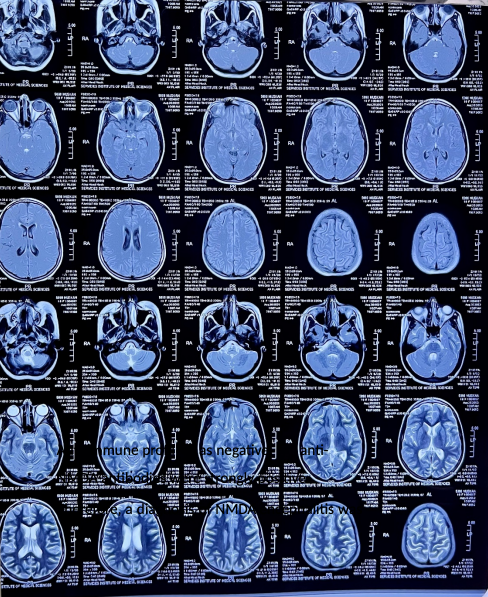Abstract
Case Study of NMDA Encephalitis in an 18-Year-Old Female With No Underlying Etiolog.
Pages: 4-10
Category: Short Report
Published Date: 21-11-2024

Sabina Nayab1, Qasim Bashir2, Adnan Aslam3, Amina Saeed khan4
Author Affiliation:
¹ Dr. Sabina Nayab, Postgraduate Resident, Department of Neurology, Services Hospital, Lahore, Pakistan.
² Prof. Dr. Qasim Bashir, Professor & Head, Department of Neurology, Services Hospital, Lahore, Pakistan
³ Dr. Adnan Aslam, Associate Professor, Department of Neurology, Services Hospital, Lahore, Pakistan
? Dr. Amina Saeed Khan, Senior Registrar, Department of Neurology, Services Hospital, Lahore, Pakistan
Keywords:
NMDA encephalitis, Anti NMDA receptor
Abstract:
Background:
Anti-NMDA receptor encephalitis is a rare autoimmune disorder caused by the formation of antibodies against NMDA receptors in the brain. Symptoms can include confusion, hallucinations, seizures, memory loss, and difficulty speaking, as well as autonomic dysfunction and movement disorders.
Case Presentation:
The case presented is of an 18-year-old female patient who presented with altered behavior, low-grade fever, and rigidity. The patient was diagnosed with NMDA encephalitis based on elevated protein levels, lymphocytes pleocytosis, and positive NMDA antibodies in serum. The patient was treated with pulse therapy with injection Solumedrol and IVIGs, leading to significant improvement. No underlying cause for the encephalitis was identified.
Conclusion:
The diagnosis is typically made through a combination of clinical findings, laboratory tests, and imaging studies, and the detection of anti-NMDA receptor antibodies in the cerebrospinal fluid (CSF) and serum. Treatment typically involves immunotherapy, such as steroids or plasma exchange, and treatment of any underlying infection or tumor. Prognosis varies based on the severity of the disorder and timing of treatment, with early diagnosis and treatment leading to better outcomes. This case highlights the importance of early diagnosis and treatment of anti-NMDA receptor encephalitis for a better outcome.